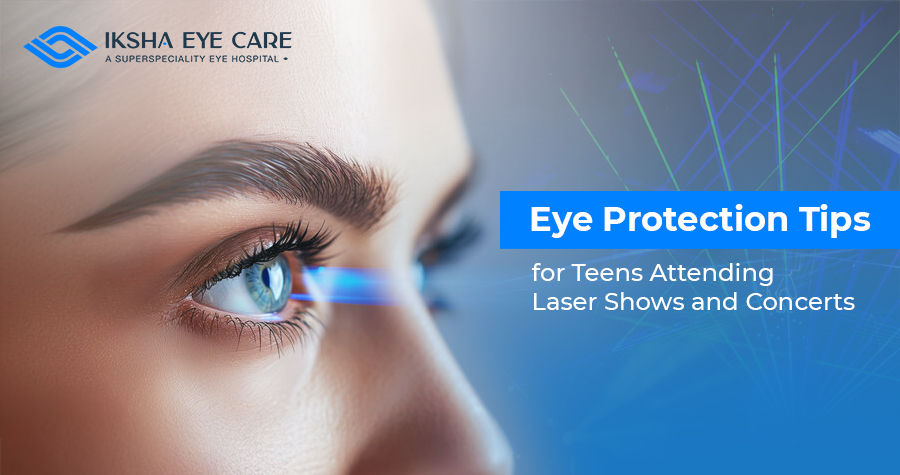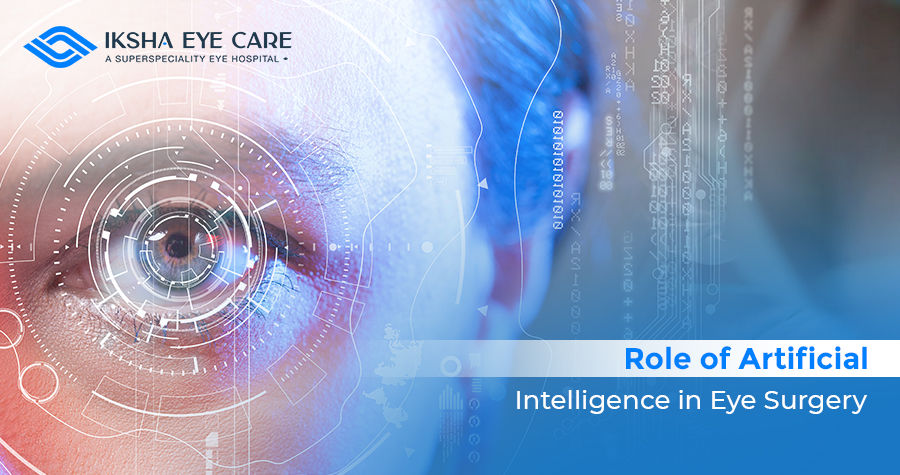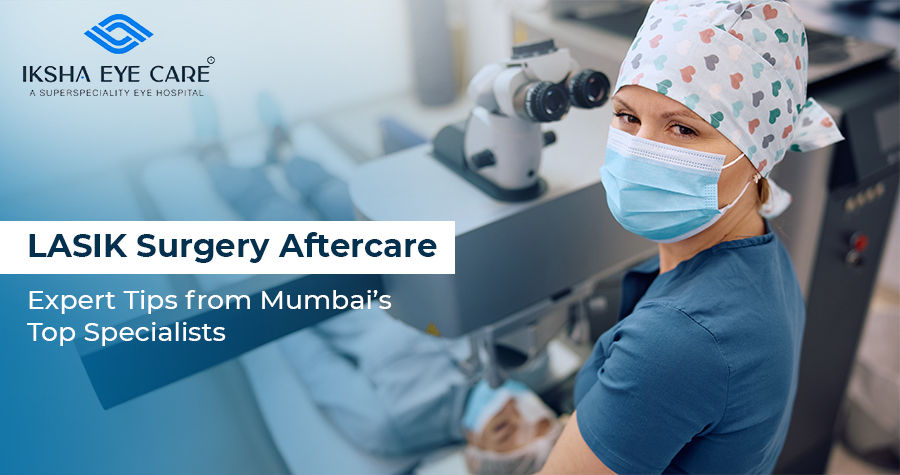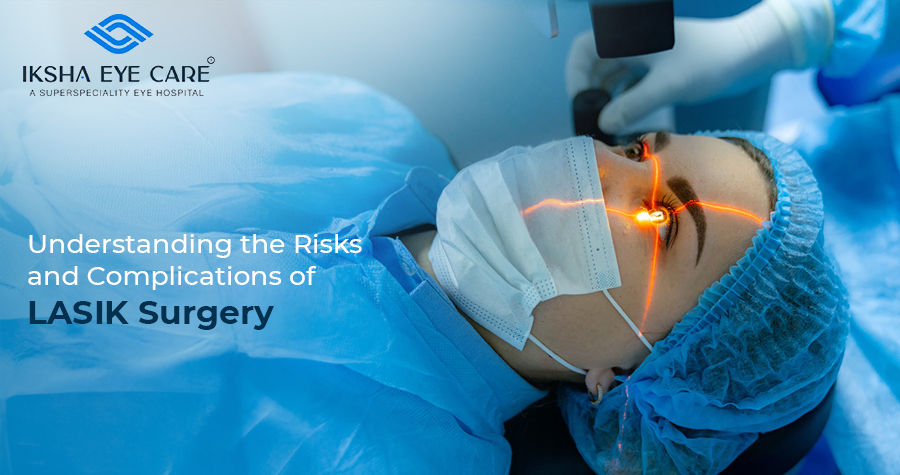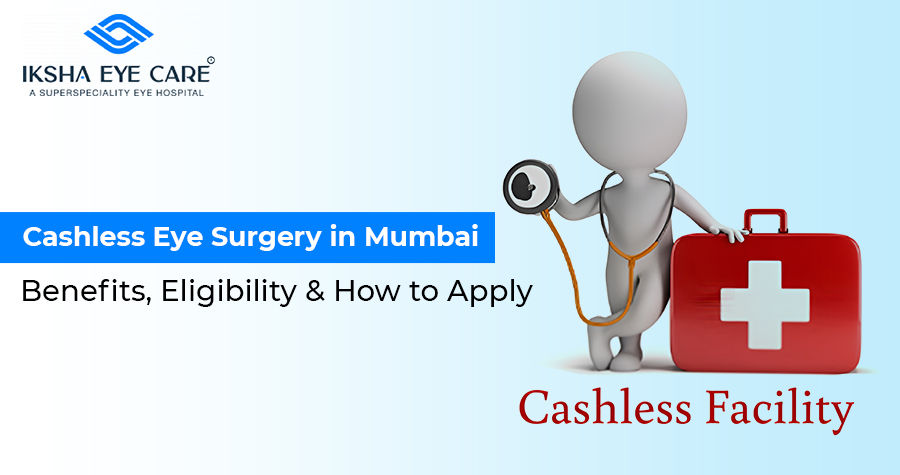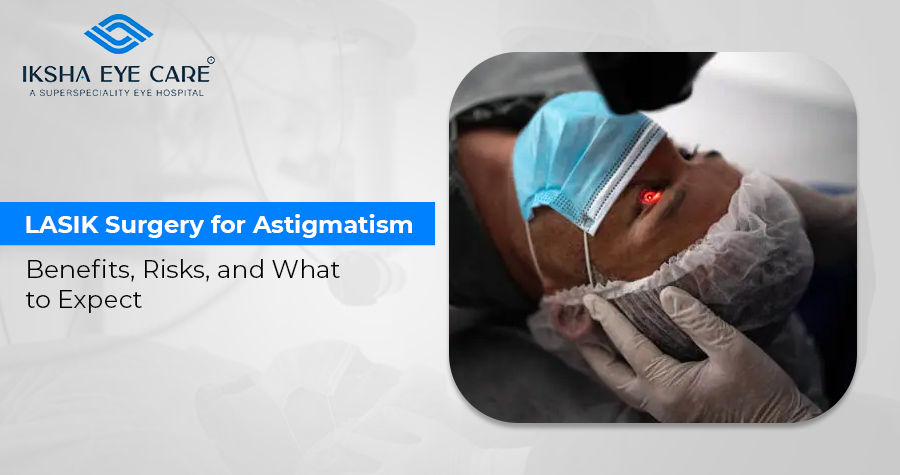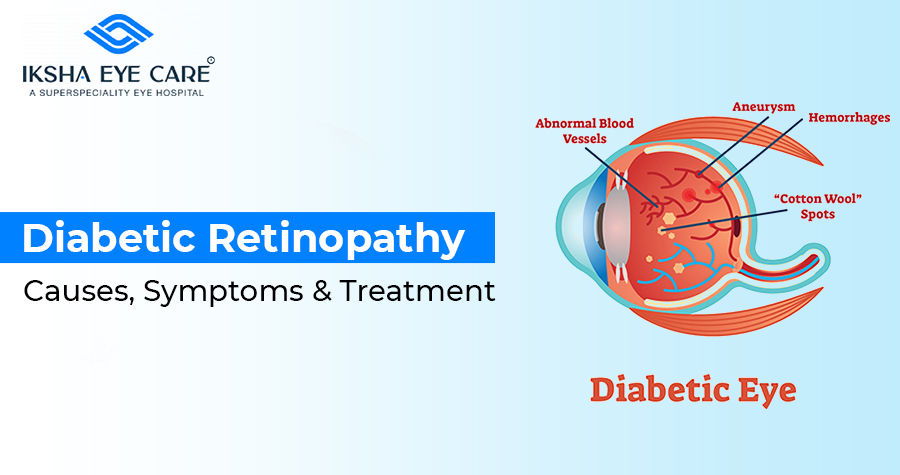Introduction:
Concerts and laser shows are an exciting part of teenage life. The adrenaline-pumping music, vibrant light displays, and immersive environments make these events unforgettable. However, amid the fun, many teens, and even parents, often overlook one critical aspect: eye care for teens at concerts. The dazzling laser beams, strobe lights, and intense spotlights that create such excitement can also pose a serious risk to eye health if not approached with caution. Whether you are a teen attending your first concert or a seasoned Person attending, it’s vital to understand the importance of protecting your eyes.
This blog, with insights from experts at Iksha Eye Care, explores effective eye protection tips for teens, safety guidelines for laser shows, and how to enjoy every beat and beam safely.
Learning the Risks: Why Laser Shows Can Harm Your Eyes
Laser shows are a popular attraction at music festivals, dancing events, and live performances. Despite their affecting appearance, these lasers focus on beams of light energy rather than just regular light. They may seriously harm eye health if not viewed at the correct angle or aimed incorrectly.
1. How Laser Lights Affect the Eyes
Because laser lights focus light into intense, compact beams, they are incredibly powerful. These beams enter the eye, particularly through the person, and focus directly on the retina, the most sensitive area of the eye. Extended or severe exposure can result in:
- Retinal burns
- Temporary or permanent vision loss
- Blurry vision or blind spots
- Eye strain and fatigue
According to specialists at Iksha Eye Care, even brief exposure to high-intensity lasers can lead to eye safety at laser shows becoming a major concern, especially for teens whose eyes may be more sensitive due to growth and development stages.
Signs of Eye Damage After a Concert or Laser Show
It’s not always easy to tell when your eyes have been affected. Here are some common symptoms to look out for after exposure to laser lights:
- Difficulty focusing
- Unexpected growth of floaters
- Light sensitivity
- Redness or irritation
- Headaches or eye strain
- A dark spot in the center of your vision
If you or your teen experience any of these symptoms post-event, consult an eye care professional like the team at Iksha Eye Care immediately.
Eye Protection Tips for Teens: Before, During, and After Events
Protecting your eyes isn’t just about what you do during the concert; it starts even before you arrive. Here’s a breakdown of eye protection tips for teens before, during, and after attending a laser show or concert.
Before the Event:
- Know the Venue Setup
- Check if the concert includes laser displays.
- Choose seats or spots that are not directly in line with laser sources.
- Avoid areas right in front of the stage where beam intensity is highest.
- Check if the concert includes laser displays.
- Wear Protective Eyewear
- Laser safety glasses are accessible online and at specialty shops, but they are not frequently marketed to audiences.
- Choose eyewear with certified protection ratings (look for ANSI Z136 standards).
- Laser safety glasses are accessible online and at specialty shops, but they are not frequently marketed to audiences.
- Avoid Alcohol or Substances That Impair Judgment
- Impaired vision combined with laser exposure can increase the risk of accidental eye injury.
- Impaired vision combined with laser exposure can increase the risk of accidental eye injury.
During the Event:
- Do Not Stare at the Lasers
- It might be tempting to watch the lights, but avoid direct eye contact with any beam.
- To prevent extended exposure, turn your head aside or blink regularly.
- It might be tempting to watch the lights, but avoid direct eye contact with any beam.
- Stay Alert in Crowd Movement
- Avoid pushing forward or looking upward into direct lights during crowd surges.
- Avoid pushing forward or looking upward into direct lights during crowd surges.
- Stay Hydrated and Blink Often
- Dry eyes become more sensitive under strong lights. Stay hydrated and make a conscious effort to blink often.
- Dry eyes become more sensitive under strong lights. Stay hydrated and make a conscious effort to blink often.
- Use Eye Drops If Needed
- Carry lubricating eye drops in your bag. Use them if your eyes start feeling dry or irritated.
- Carry lubricating eye drops in your bag. Use them if your eyes start feeling dry or irritated.
After the Event:
- Give Your Eyes a Rest
- Avoid screens or bright lights for a few hours post-concert.
- Let your eyes relax in a dim environment.
- Avoid screens or bright lights for a few hours post-concert.
- Cold Compress for Irritation
- If your eyes feel tired or sore, apply a cold compress for relief.
- If your eyes feel tired or sore, apply a cold compress for relief.
- Visit an Eye Care Professional if Discomfort Persists
- Iksha Eye Care recommends scheduling an eye checkup if you notice lingering irritation, blurred vision, or pain.
- Iksha Eye Care recommends scheduling an eye checkup if you notice lingering irritation, blurred vision, or pain.
Iksha Eye Care’s Expert Insight: Teen Eye Safety in a Digital and Event-Heavy World
At Iksha Eye Care, specialists see a growing number of teenage patients experiencing vision issues from recreational exposures, including laser shows, gaming, and screen use. Here are a few expert insights:
- Preventative care is critical. Teens should have regular eye exams, especially those who attend events frequently.
- UV and laser protection lenses can double as stylish accessories and health protectors.
- Education is power. Most teens aren’t aware of laser dangers, so spreading awareness is key.
How to Protect Eyes at Concerts: Parental Tips
If you’re a parent reading this, here are a few things you can do to help ensure your teen’s eyes are safe at events:
- Discuss the risks openly: Share your tips on how to protect eyes at concerts.
- Provide suitable protective eyewear: Invest in high-quality protective sunglasses or laser safety glasses.
- Choose safe venues: When buying tickets, check the organizer’s safety compliance and past reviews related to lighting.
Laser Eye Protection Tips: Myths vs Facts
Let’s dispel certain misunderstandings and provide clear information regarding laser eye protection advice:
| Myth | Fact |
| Laser lights at concerts are harmless. | High-powered lasers can damage the retina and cause vision problems. |
| You can tell if your eyes are being damaged. | Damage can occur without immediate symptoms. |
| All sunglasses offer laser protection. | Only specially rated laser safety glasses provide true protection. |
| You need to stare into the laser for it to harm you. | Even brief exposure can cause retinal burns if the beam is strong. |
Additional Eye Safety Tips for Concertgoers
- Carry a Spare Pair of Eyewear
- Always carry an extra pair of prescription glasses in case yours become damaged at the event.
- Always carry an extra pair of prescription glasses in case yours become damaged at the event.
- Avoid DIY Laser Pointers
- These aren’t toys. Teenagers who experiment with laser pointers risk permanently harming themselves or their pals.
- These aren’t toys. Teenagers who experiment with laser pointers risk permanently harming themselves or their pals.
- Maintain a Safe Distance
- As one gets farther away from laser sources, the light intensity drops.
- As one gets farther away from laser sources, the light intensity drops.
- Avoid Taking Flash Photos with Direct Light in Eyes
- Even from phones or cameras, sudden, strong flashes can irritate the eyes, particularly following laser exposure.
Long-Term Eye Health: Why Teens Should Prioritize Eye Safety
Teens are at a formative stage, not just in their life choices but in their physical development, including the eyes. Repeated exposure to harmful lights without proper care can lead to cumulative damage that shows up in adulthood. Iksha Eye Care highlights that adopting eye care for teens at concerts is not a one-time thing but a habit that contributes to long-term vision health.
Vision Problems That Can Be Avoided:
- Photokeratitis (sunburn of the cornea)
- Retinal scarring
- Early onset of age-related macular degeneration
- Chronic dry eye syndrome
It’s always better to prevent than to treat. Additionally, your eyesight cannot be replaced.
Conclusion: Enjoy the Show, But Protect Your Vision
Attending a concert or laser show should be an electrifying experience, without any long-term consequences for your eyes. By following these eye protection tips for teens, staying informed, and making smart choices, teens can enjoy the music, lights, and vibe safely. Vision is for life; don’t risk it for a few minutes of visual thrills.
For expert guidance, regular checkups, or if you experience any eye discomfort after an event, consult the trusted specialists at Iksha Eye Care. They are the go-to option for both emergency and preventive care because of their teen-focused approach to eye health.
Frequently Asked Questions (FAQ)
Q1. Why is eye care important for teens attending concerts and laser shows?
A: The strong beams from laser lights used at concerts can damage the retina if they are viewed directly. Teens are more vulnerable because of their more sensitive eyes. Preventing short-term or long-term vision issues is possible through effective eye care.
Q2. Can laser lights really cause permanent eye damage?
A: Yes. High-intensity laser beams can cause retinal burns, blind spots, or even permanent vision loss, especially when stared at directly or exposed to for extended periods.
Q3. What are the signs of eye damage after a laser show?
A: Common symptoms include blurry vision, eye pain, floaters, increased light sensitivity, headaches, and difficulty focusing. If these persist, consult a specialist like those at Iksha Eye Care.
Q4. How can parents help teens protect their eyes during such events?
A: Encourage awareness about risks, buy them certified protective glasses, choose safer venue seating, and schedule regular eye check-ups with a trusted clinic like Iksha Eye Care.






